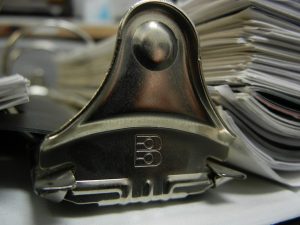The Nightmare Client
 Some of our greatest lessons are learned in the most painful way. Little did I know the first time I met Walter Forman (not his name) that he would create so much havoc in my legal nurse consulting business. He was my nightmare client. We believed we were good at spotting problem clients. We thought our systems were strong enough to protect us from most foreseeable trouble. We were wrong.
Some of our greatest lessons are learned in the most painful way. Little did I know the first time I met Walter Forman (not his name) that he would create so much havoc in my legal nurse consulting business. He was my nightmare client. We believed we were good at spotting problem clients. We thought our systems were strong enough to protect us from most foreseeable trouble. We were wrong.
The subtle red flags were there right at the beginning. Walter called to say he needed an expert witness to review care his mother received in the hospital. He implied he was an attorney, but when he got to our office, we found out he was not. Walter explained that his wife was an attorney, and would handle the case, but he was there to deliver the medical records and retainer. Although Walter presented himself as the courier, he was so much more.
Here were the warning signs of my nightmare client:
-
- Walter wanted to know in advance how much time the expert would spend. He said he was footing the bill because his brothers did not have money. We anticipated having collection issues.

- When Walter brought the medical records, he insisted the expert only had to review a few pages. The records were a disorganized mess. We insisted our expert had to have the full file and that we would organize it for the expert. He reluctantly turned it over.
- Walter was very emotional. He sobbed in the bathroom after describing how his mother died.
- As time went on, we found out his wife was not a medical malpractice attorney, had never worked as an attorney, and knew very little about how to handle the case. The attorney was the daughter-in-law of the decedent. We’ve seen objectivity can be lost in the few cases we’ve handled involving an attorney pursuing a case involving a family member.
The nightmare client’s smiles turn to screams
Our nursing expert witness found liability and wrote a report. In a phone call, Walter screamed at me when he got the bill. He was outraged that we charged him for turning his disorganized record into a coherent one. In this conversation, I said to Walter, “When we talk, we need to take turns. I listened to you. I did not interrupt you. Now it is your turn to listen to me.”
He calmed down and promised he would not lose control again. Unnerved by his behavior, I offered to refund his money and let him find another expert. He insisted he wanted our expert; we are “the best” in the state. I insisted to Walter that we dealt with the attorney and not family members.
In our next phone call, Walter asked us for a referral to a physician expert to review the case. He came to the office to bring a check and cried in the bathroom again. The physician we referred did not find liability. Walter was deeply disappointed and called me to scream at me about the expert: “You promised me the doctor would help us.” “Walter, I promised he would look at the file but I did not promise I could predict his conclusions.”
Walter found another physician expert who said what he needed.
Deposition of the Expert
When it was time for our nursing expert to be deposed, following our standard practice, we asked for the predeposition retainer. My nightmare client insisted our expert could not spend more than an hour to prepare, even though she had received new material and had to re-review the file. I talked to Walter’s wife, the attorney, and reminded her that she was our client and we were supposed to be dealing with her and not her husband. She agreed the expert could take the time she needed to be prepared. Meanwhile she found a co-counsel who understood medical malpractice law.
When Walter saw the invoice for the deposition, he called me and screamed, “I told you she could not have more than one hour to prepare. This is outrageous…” and he said a whole lot more, including threats to badmouth my business. This time he was out of control and would not listen to anything I tried to say. He refused to pay the invoice. When I called his wife to remind her she was our client, and to describe his bullying behavior, she said, “We are no longer living together. He pays the bills and I handle the case.”
We were caught in an impossible situation with
- an angry man in charge of payment who would not pay the invoice
- an attorney who was our client, but not effective in getting payment for us
- a messy marriage which should have been none of our business
I now took a step that had never been necessary before. After discussion with my business attorney, I withdrew the expert from the case because of Walter’s unwillingness to pay the bill, his behavior, and my unwillingness to subject myself and staff any longer to this nightmare client’s behavior. My attorney prepared a release that specified that
- The expert was being withdrawn from the case.
- We would not pursue payment for her deposition if the attorney and her husband agreed to not harm the reputation of our firm.
- The attorney could make arrangements to pick up the file if she wanted it but the husband was not allowed in our building.
We received the signed agreement back and hoped we would never hear Walter’s name again.
Trial
Without an expert witness, the attorney dropped the hospital as a defendant. Just recently I read that the case of Walter’s mother went to trial against the physician. The jury came back with a defense verdict.
Walter was deeply distraught over how his mother died. Any compassion I felt for him was eroded by his explosive anger. It made him a frightening person to deal with. I began to see him as a huge bully. We learned from Walter’s behavior that it is difficult if not impossible to deal with a man with these issues. Our attempts to be compassionate, supportive and understanding worked up to a point, but eventually burned out. Walter could not put boundaries on his grief and anger. First he was angry with the doctors and nurses and then he turned that anger on us.
The final p.s. of the story is that Walter sent me a request to connect with me on Linkedin. I ignored it.
Have you had a Walter in your business? Share your story.
 Avoid the pain of collection issues. Invest in Stop Collection Issues and Get Paid. Pat Iyer shares lessons learned from collecting from attorneys and how you can avoid the traps that prevent you from getting paid.
Avoid the pain of collection issues. Invest in Stop Collection Issues and Get Paid. Pat Iyer shares lessons learned from collecting from attorneys and how you can avoid the traps that prevent you from getting paid.
